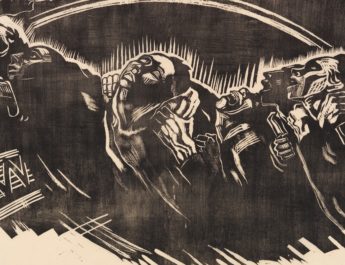Exodus 14:5-7, 10-14, 21-29
Narrative Lectionary 104
Biblehub
5 When the kingI of EgyptII was toldIII that the peopleIV had fled,V
Notes on verse 5a
I “king” = melek. From malak (to be or become king or queen, to rise to the throne, to be crowned; by implication, to take counsel). This is king or royal.
II “Egypt” = Mitsrayim. Perhaps from matsor (besieged or fortified place, bulwark, entrenchment; something hemmed in; a siege or distress or fastness); from tsur (to confine, besiege, to cramp). This is Egypt.
III “told” = nagad. This is to declare, make conspicuous, stand in front, manifest, predict, explain.
IV “people” = am. From amam (to darken, hide, associate; creating shadows by huddling together). This is people or nation. It can be used specifically for a tribe, collectively of troops or armies, or figuratively to refer to a flock of animals.
V “fled” = barach. This is to flee, drive away, hurry, to bolt.
the mindsVI of PharaohVII and his officialsVIII were changedIX toward the people,
Notes on verse 5b
VI “minds” = lebab. May be related to labab (to encourage; properly, to be encased as with fat; used in a good sense, this means to transport someone with love; used in a bad sense, it can mean to dull one’s senses). This is the heart, courage, one’s inner self, the mind, or the will. Heart is only used in a figurative sense in the Old and New Testaments.
VII “Pharaoh” = Paroh. From Egyptian pr (palace, pharaoh; literally house + great). This is Pharaoh, a title for Egyptian kings. See https://en.wiktionary.org/wiki/pharaoh
VIII “officials” = ebed. From abad (to work, serve, compel; any kind of work; used causatively, can mean to enslave or keep in bondage). This is a servant, slave, or bondservant.
IX “changed” = haphak. This is to turn, overturn, change, return, turn over, pervert.
and they said, “What have we done,X letting IsraelXI leaveXII our service?”XIII
Notes on verse 5c
X “done” = asah. This is to make, do, act, appoint, become in many senses.
XI “Israel” = Yisrael. From sarah (to persist, exert oneself, contend, persevere, wrestle, prevail) + el (God or god). This is Israel, meaning God strives or one who strives with God; new name for Jacob and for his offspring. This refers to the people and to the land.
XII “letting…leave” = shalach. This is to send out, away, send for, forsake. It can also mean to divorce or set a slave free.
XIII “service” = abad. Related to “officials” in v5. See note VIII above.
6 So he had his chariotXIV made readyXV and tookXVI his armyXVII with him;
Notes on verse 6
XIV “chariot” = rekeb. From rakab (to ride an animal or in some vehicle; also, bringing on a horse). This is a vehicle, wagon, or chariot. It can be cavalry or an individual rider.
XV “made ready” = asar. This is to tie, yoke, bind, or fasten. It can mean to harness an animal, to join in fighting a battle, or to imprison someone.
XVI “took” = laqach. This is to take, accept, carry away, receive. It can also have the sense of take a wife or take in marriage.
XVII “army” = am. Same as “people” in v5. See note IV above.
7 he took sixXVIII hundredXIX eliteXX chariots and allXXI the other chariots of Egypt with officersXXII over all of them.
Notes on verse 7
XVIII “six” = shesh. This is six. Figuratively, it can be a surplus since it is one more than the number of fingers on the hand.
XIX “hundred” = meah. This is hundred or some number times one hundred (i.e. hundredfold or the base of two hundred, three hundred, etc.).
XX “elite” = bachur. From bachar (to choose, appoint, try, excellent). This is choice, chosen, selected. It is a youth or young man.
XXI “all” = kol. From kalal (to complete). This is all or every.
XXII “officers” = shaliysh. 17x in OT. From shalosh (three, fork, triad). This is literally a third. So, it could refer to some kind of musical instrument like a triangle or a lute with three strings. It could also refer to a triple measure. Additionally, it could be a highly ranked person like a captain, lord, or prince.
10 As Pharaoh drew near,XXIII the Israelites looked back,XXIV andXXV there were the EgyptiansXXVI
Notes on verse 10a
XXIII “drew near” = qarab. This is to come near, offer, make ready, approach, take.
XXIV “Israelites looked back” = nasa + ben + Yisrael + et + ayin. Literally, “the children of Israel lifted their eyes.” Nasa is to lift in a broad sense, literally and figuratively. So it could be to carry, take, or arise. It could also be bring forth, advance, accept. Ben is from banah (to build or obtain children). This is son, age, child. It is son in a literal or figurative sense. Yisrael is from sarah (to persist, exert oneself, contend, persevere, wrestle, prevail) + el (God or god). This is Israel, meaning God strives or one who strives with God; new name for Jacob and for his offspring. This refers to the people and to the land. Ayin is eye in a literal or figurative sense so eye, appearance, favor, or a fountain (the eye of the landscape).
XXV {untranslated} = hinneh. From hen (lo! Behold! If, though; an expression of surprise). This is to draw attention, show suddenness or surprise, or to emphasize the importance of the coming statement. See! Lo! Behold!
XXVI “Egyptians” = Mitsri. Related to “Egypt” in v5. From the same as Mitsrayim (see note II above). This is Egyptian.
advancingXXVII onXXVIII them. In greatXXIX fearXXX the Israelites cried outXXXI to the Lord.XXXII
Notes on verse 10b
XXVII “advancing” = nasa. This is properly pulling up as when one pulls up tent pegs or stakes. This would imply striking tents in order to start a journey. So this could be bring, pullout, set out, journey, or cause to go away.
XXVIII “on” = achar. From achar (to remain behind, linger, continue, be behind, or delay; can also imply procrastination). This is after or the last part, following.
XXIX “great” = meod. Perhaps from the same as uwd (firebrand, a poker). This is very, greatly, exceedingly. It can also mean vehemence, force, abundance.
XXX “fear” = yare. This is to fear, be afraid, dreadful. It can also refer to fearful reverence – to fear in a moral sense is to say to revere, respect.
XXXI “cried out” = tsaaq. This is to cry out or call together, to shriek. It can mean, by implication, calling for an assembly.
XXXII “Lord” = YHVH. From havah (to be, become) or hayah (to come to pass, become, be). This is the name of the God of Israel, the self-existent and eternal one, the tetragrammaton. This pronunciation has been lost to time so “Lord” is generally used in its place.
11 They said to Moses,XXXIII “Was it becauseXXXIV there were no gravesXXXV in Egypt that you have taken us away to dieXXXVI in the wilderness?XXXVII What have you done to us, bringingXXXVIII us out of Egypt?
Notes on verse 11
XXXIII “Moses” = Mosheh. From mashah (to pull out in a literal or figurative sense, to draw out) OR from Egyptian mes or mesu (child, son i.e. child of…). This is Moses – the one drawn out from the water, which is to say, rescued. If derived from the Egyptian, his name would share a root with Rameses and Thutmose.
XXXIV “because” = beli. From balah (to grow old, wear out, waste away, consume, spend). This is properly a failure. So, it could mean without, not yet, unawares, lacking, something that wears out, or because not.
XXXV “graves” = qeber. From qabar (to bury). This is a place where one is buried such as a grave or tomb.
XXXVI “die” = mut. This is to die in a literal or figurative sense. It can also refer to being a dead body.
XXXVII “wilderness” = midbar. From dabar (to speak, command, declare). This is mouth or speech. It can also be desert or wilderness. Additionally, it can be used for a pasture to which one drives cattle.
XXXVIII “bringing” = yatsa. This is to go or come out, bring forth, appear. It is to go out in a literal or figurative sense.
12 Is this not the very thingXXXIX we toldXL you in Egypt, ‘Let us aloneXLI so that we can serveXLII the Egyptians’? For it would have been betterXLIII for us to serve the Egyptians than to die in the wilderness.”
Notes on verse 12
XXXIX “thing” = dabar. Related to “wilderness” in v11. From dabar (see note XXXVII above). This is speech, a word, a matter, an affair, charge, command, message, promise, purpose, report, request. It is a word, which implies things that are spoken of in a wide sense.
XL “told” = dabar. Related to “wilderness” in v11 & “thing” in v12. See note XXXVII above.
XLI “let…alone” = chadal. This is properly to be flabby – it implies, to stop, fall, end, rest, leave alone, forsake, or desist. Figuratively this can be lacking or idle.
XLII “serve” = abad. Same as “service” in v5. See note XIII above.
XLIII “better” = tob. From tob (to be pleasing, to be good). This is good, beautiful, pleasant, agreeable, bountiful, at ease. This word is used for goodness as a concept, a good thing, a good person. This can refer to prosperity and welfare as well as joy, kindness, sweetness, and graciousness. So, this is ethically good, but also enjoyably good.
13 But Moses said to the people, “Do not be afraid,XLIV stand firm,XLV and seeXLVI the deliveranceXLVII that the Lord will accomplishXLVIII for you today,XLIX
Notes on verse 13a
XLIV “be afraid” = yare. Same as “fear” in v10. See note XXX above.
XLV “stand firm” = yatsab. This is to set oneself, take a stand, remain, continue, to station or set something in place.
XLVI “see” = raah. This is to see in a literal or figurative sense so stare, advise, think, view.
XLVII “deliverance” = yeshuah. From yasha (to deliver, defend, help, preserve, rescue, be safe. Properly, to be open, wide or free, which implies being safe. Used causatively, it means to free). This is salvation, deliverance, health, victory, prosperity.
XLVIII “accomplish” = asah. Same as “done” in v5. See note X above.
XLIX “today” = yom. Root may mean being hot. This is the day in a literal or figurative sense. It can also mean birth, age, daylight, continually or other references to time.
for the Egyptians whom you see today you shall neverL see again.LI 14 The Lord will fightLII for you, and you have only to keep still.”LIII
Notes on verses 13b-14
L {untranslated} = yasaph. This is to add, increase, continue, exceed.
LI {untranslated} = ad + olam. Literally, “even to forever.” Olam is a long scope of time whether in the past (antiquity, ancient time) or in the future (eternal, everlasting).
LII “fight” = lacham. This is to eat or feed on. Figuratively, it is to battle as a kind of consumption/destruction.
LIII “keep still” = charash. This is to scratch, which implies etching or plowing. It can mean to manufacture regardless of materials used. Figuratively, it can be to devise or conceal. It can also have a sense of secrecy. Hence, being silent or left alone. It can also be speechless.
21 Then Moses stretched outLIV his handLV over the sea.LVI
Notes on verse 21a
LIV “stretched out” = natah. This is to stretch or spread out, to extend, or bend. In can also imply moral deflection.
LV “hand” = yad. This is hand, ability, power. Hand in a literal sense, but also what one can do or the means by which one does it.
LVI “sea” = yam. Root may mean to roar. This is the sea, often referring to the Mediterranean. It comes from the root in the sense of the roar of crashing surf. This word is sometimes used for rivers or other sources of water. It can mean to the west or to the south.
The Lord drove the sea backLVII by a strongLVIII eastLIX windLX
Notes on verse 21b
LVII “drove…back” = halak. This is go, come, walk. It is walk literally and figuratively and includes people and animals. It can be used figuratively for one’s moral life – how we walk according to God’s way or against it. It can also refer to the walk of life as in the course one’s life takes, the choices we make, etc.
LVIII “strong” = az. From azaz (to be strong, become fixed, be bold, prevail, be impudent; it means to be stout literally or figuratively; a Late Hebrew word). This is strong or mighty. It can also refer to power or vehemence or mean greedy.
LIX “east” = qadim. From the same as qedem (front, formerly, before, east, eternal, everlasting, antiquity). This is the front part and so eastward. Sometimes used as a shorthand for the east wind.
LX “wind” = ruach. This is breath, wind, air, cool, spirit. This is wind, which resembles the breath and so this can be used figuratively for life itself or being frail/mortal/impermanent. It can refer to the air of the sky or the spirit.
all nightLXI and turnedLXII the sea into dry land,LXIII and the watersLXIV were divided.LXV
Notes on verse 21c
LXI “night” = layil. Properly, this refers to light twisting away. It is used for night or midnight. Figuratively, this can mean adversity.
LXII “turned” = sim. This is to put or place in a literal or figurative sense. It can be appoint, care, change, make, and may other things.
LXIII “dry land” = charabah. 8x in OT. From chareb (to be waste or desolate, destroyer). This is dry ground, dry, or desert.
LXIV “waters” = mayim. This is water, waters, or waterway in a general sense. Figuratively, it can also mean juice, urine, or semen.
LXV “divided” = baqa. This is to break open, breach, divide, rip, shake, tear. It can also mean dash into pieces or being ready to burst.
22 The Israelites wentLXVI intoLXVII the sea on dry ground,LXVIII the waters forming a wallLXIX for them on their rightLXX and on their left.LXXI
Notes on verse 22
LXVI “went” = bo. This is to enter, come in, advance, fulfill, bring offerings, enter to worship, attack. It can also have a sexual connotation.
LXVII “into” = tavek. This is among, middle, in the midst, the center. Perhaps, properly, to sever.
LXVIII “dry ground” = yabbashah. 14x in OT– word used for dry land in Genesis 1:9-10. From yabesh (to dry up, be withered, be dry; to be ashamed, confused, or disappointed). This is dry land or dry ground.
LXIX “wall” = chomah. From the same as cham (father-in-law – one’s husband’s father; perhaps from a root meaning to join). This is a wall – as used for protection.
LXX “right” = yamin. May be from yamam (to go or choose the right, use the right hand; to be physically fit or firm). This can mean right hand, right side, or south. Since most people are right-handed, the metaphorical usage of this word presumes that the right hand is stronger and more agile. Thus, it is the instrument of power and action.
LXXI “left” = semol. Perhaps from the same as simlah (mantle, clothes, wrapper); perhaps from semel (image, figure, likeness). This is left, left side, or north as the part that is dark.
23 The Egyptians pursuedLXXII and went intoLXXIII the sea afterLXXIV them, all of Pharaoh’s horses,LXXV chariots, and chariot drivers.LXXVI
Notes on verse 23
LXXII “pursued” = radaph. This is to chase after, pursue, hunt, or persecute. It is running after someone or something, generally with hostile motives.
LXXIII {untranslated} = tavek. Same as “into” in v5. Se note LXVII above.
LXXIV “after” = achar. Same as “on” in v10. See note XXVIII above.
LXXV “horses” = sus. Root may mean to skip as in jump for joy. This is a crane or a swift bird. It is also a horse as leaping.
LXXVI “chariot drivers” = parash. From parash (to make distinct, separate, scatter; can also imply to wound). This is a horse or a person who rides a horse. A chariot driver or cavalry as a collective.
24 LXXVIIAt the morningLXXVIII watchLXXIX the Lord, in the pillarLXXX of fireLXXXI and cloud,LXXXII
Notes on verse 24a
LXXVII {untranslated} = hayah. Related to “Lord” in v10. See note XXXII above.
LXXVIII “morning” = boqer. From baqar (to seek, plow, break forth, admire, care for). This refers to the break of day. So it is dawn, early, morning, or morrow.
LXXIX “watch” = ashmoreth. 7x in OT. From shamar (to keep, watch, preserve; to guard something or to protect it as a thorny hedge protects something). This is a watch.
LXXX “pillar” = ammud. From amad (to stand up in a literal or figurative sense; to establish, continue, endure, take a stand, act, be a servant, stand still, remain, stand against an enemy). This is a pillar, stand, or platform.
LXXXI “fire” = esh. This is fire, burning, flaming, hot. It is fire in a literal or figurative sense.
LXXXII “cloud” = anan. May be from anan (cover, cloud over; figuratively, acting in a secret way, practicing magic or soothsaying). This is a cloud as something that covers the sky.
looked downLXXXIII on the Egyptian armyLXXXIV and threw the Egyptian armyLXXXV into a panic.LXXXVI
Notes on verse 24b
LXXXIII “looked down” = shaqaph. This is to look down or look out. Properly, it is looking by leaning out a window. It can be peeping or gazing.
LXXXIV “army” = machaneh. From chanah (to decline, bending down, or living in tents; can be camping to create a home or camping as a part of battle). This is an encampment, whether of people traveling together or soldiers. So, it can be a camp band, or company as well as an army of soldiers. Also can be used of other groups like animals, angels or stars.
LXXXV “army” = machaneh. Same as “army” in v24. See note LXXXIV above.
LXXXVI “threw…into a panic” = hamam. 14x in OT. This is being noisy, confused, thrown into confusion, trouble, cause a commotion, disturb, rout, damage, destroy.
25 He cloggedLXXXVII their chariotLXXXVIII wheelsLXXXIX so that they turnedXC with difficulty.XCI
Notes on verse 25a
LXXXVII “clogged” = sur. This is to turn aside in a literal or figurative sense – to depart, decline, rebel, remove, or withdraw.
LXXXVIII “chariot” = merkabah. Related to “chariot” in v6. From merkab (chariot, saddle, covering; any seat in a vehicle); from rakab (see note XIV above). This is a chariot.
LXXXIX “wheels” = ophan. Root might be to revolve so this is a wheel.
XC “turned” = nahag. This is to drive as in driving flocks, but also driving in animal or vehicle like a chariot. It can mean to carry away, lead, drive away, proceed, or guide. It can also relate to behavior and what one is accustomed to.
XCI “difficulty” = kebeduth. 1x in OT. From kabad (to be heavy, weighty, or severe; abounding in, rich, or honorable). This is heaviness or difficulty.
The Egyptians said, “Let us fleeXCII fromXCIII the Israelites, for the Lord is fighting for them against Egypt.”
26 Then the Lord said to Moses, “Stretch out your hand over the sea, so that the water may come backXCIV upon the Egyptians, upon their chariotsXCV and chariot drivers.”
Notes on verses 25b-26
XCII “flee” = nus. This is to flee, vanish away, hide, escape, be displayed.
XCIII {untranslated} = paneh. From panah (to turn, face, appear). This is face in a literal or figurative sense. It could be face, presence, anger, respect. It can also be used of God to indicate divine favor or presence.
XCIV “come back” = shub. To turn back, return, turn away – literally or figuratively. Doesn’t necessarily imply going back to where you started from. This is also the root verb for the Hebrew word for repentance “teshubah.”
XCV “chariots” = rekeb. Same as “chariot” in v6. See note XIV above.
27 So Moses stretched out his hand over the sea, and atXCVI dawnXCVII the sea returnedXCVIII to its normal depth.XCIX As the Egyptians fled beforeC it, the Lord tossedCI the Egyptians intoCII the sea.
Notes on verse 27
XCVI {untranslated} = panah. Related to {untranslated} in v25. See note XCIII above.
XCVII “dawn” = boqer. Same as “morning” in v24. See note LXXVIII above.
XCVIII “returned” = shub. Same as “come back” in v26. See note XCIV above.
XCIX “normal depth” = ethan. 13x in OT. Root might mean to continue. This is mighty, strong, ever-flowing, enduring, or permanence.
C “before” = qirah. From the same as qara (to happen, meet, bring about). This is any kind of encounter, whether peaceful, hostile, or incidental. It can also mean help or seek.
CI “tossed” = naar. 11x in OT. This is to shake, toss up and down, tumble around, overthrow, shake off.
CII “into” = tavek. Same as “into” in v5. Se note LXVII above.
28 The waters returned and coveredCIII the chariotsCIV and the chariot drivers, the entireCV armyCVI of Pharaoh
Notes on verse 28a
CIII “covered” = kasah. This is to cover, conceal, overwhelm. It is to cover as clothes do or to hide a secret.
CIV “chariots” = rekeb. Same as “chariot” in v6. See note XIV above.
CV “entire” = kol. Same as “all” in v7. See note XXI above.
CVI “army” = chel. From chul (whirling around so dancing as in a circle or writhing in pain; used particularly for the pain of childbirth or from writhing due to fear; can also be falling in pain or waiting) OR from chayil (strength, wealth, ability, activity; a soldier or a company of soldiers; goods; a force of people, means, or goods; valor, virtue, or strength); from chul (to be firm, strong, prosperous; to endure). This is an army, entrenchment, fortress, wall, or host.
that had followedCVII them into the sea; not oneCVIII of them remained.CIX 29 But the Israelites walkedCX on dry ground throughCXI the sea, the waters forming a wall for them on their right and on their left.
Notes on verses 28b-29
CVII “followed” = bo + achar. Bo is the same as “went” in v22. See note LXVI above. Achar is the same as “on” in v10. See note XXVIII above.
CVIII “one” = echad. Perhaps from achad (to unify, continue on a path; figuratively, to gather one’s thoughts). This is the number one, first, united. It can also be alone, altogether, a certain, a few.
CIX “remained” = shaar. Properly, this is swelling up i.e. being left over, a remnant, remaining, being redundant.
CX “walked” = halak. Same as “drove…back” in v21. See note LVII above.
CXI “through” = tavek. Same as “into” in v5. Se note LXVII above.
Image credit: “Crossing the Red Sea” by lforce, 2019.




